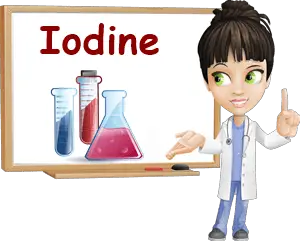As a trace element, iodine is essential for normal growth and development. About 60% of all our body’s reserves of iodine are stored in the thyroid gland, a fairly large endocrine gland situated in the neck area. As suspected, the mineral supports thyroid activity and helps regulate thyroid hormone production. This, in turn, helps regulate vital metabolic processes and promotes good energy levels and cognitive development. Iodine is a dietary mineral with immune boosting and detoxifying properties as well as endocrine benefits, among many other health effects.
The thyroid gland is famous for its more than unpleasant outbursts which include severe and sudden weight gain or weight loss (not of the good kind), high sensitivity to either cold or heat, fatigue, goiter and so on. Iodine is essential for regulating thyroid activity and hormone production, thus preventing the distressing symptoms of an underactive thyroid that can significantly reduce the quality of one’s life.

In addition to this, it helps remove toxins from the body, prevents the accumulation of fat and regulates selenium, calcium and silicon metabolism. As a side note, silicon is also a health-friendly mineral found in cereals, cabbage, onions, carrot, apples, oranges, pumpkin, etc. A deficit will lead to brittle nails, thin hair and wrinkles. But let’s go back to our mineral of the day. Considering its impressive properties, it is vital that we have an adequate intake in order to enjoy good overall health.
Iodine deficiency signs and symptoms
Signs and symptoms of iodine deficiency include:
- irritability
- depression
- fatigue
- perception problems
- goiter (swelling of the thyroid gland)
- inexplicable constipation
- abnormal weight gain (associated with hypothyroidism)
- fertility problems and infertility in women
- rough skin and other skin issues
- intellectual disability or mental retardation in cases of a severe deficiency.
According to the World Health Organization (WHO), iodine deficiency is a leading cause of intellectual disabilities worldwide. A poor diet as a result of poverty most often leads to a iodine deficit. Because diet plays such an incredible role in supplying the body with the needed amounts of the mineral, it is best to consume certain foods regularly.

Foods rich in iodine
Seafood, fish and shellfish and kelp contain generous amounts of iodine, which they absorb from sea water. To get enough iodine, make sure you include in your diet the following foods: canned sardines, tuna, cod, halibut, perch, salmon, sea bass and, when your budget allows for it, shrimp, oysters, clams etc. However, if you are allergic to seafood, avoid it and look for other dietary sources of iodine that do not pose any health risks for you (fish could still be an option). See the fish and seafood map and learn about the benefits of each food presented.
Iodine plant sources
Other great sources of plant origin are garlic, zucchini, sesame seeds, spinach, beet, turnip greens and lima (butter) beans, as well as a handful of dairy products. Table salt is a good option for supplying your daily diet with sufficient amounts of the mineral, as long as you choose iodized salt varieties (not all salt contains added iodine, unless specified on the label). Nevertheless, always remember not to exceed daily requirements of iodized salt because sodium is bad for you in high amounts.
What are the benefits of iodine?
Considering I have spoken so highly of the mineral, it is only natural that I give you a few reasons why it is this good for you. So here are some of the many health benefits of iodine:
Vital for normal physical and intellectual development
Iodine has a great influence on an important hormone-producing gland, the thyroid. Among other things, this endocrine gland produces thyroxine and triiodothyronine, two hormones that affect heart rate, blood pressure, physical and mental development, body weight and temperature.
Improves energy levels
By ensuring the body makes good use of calories, iodine basically prevents excess fat from depositing in tissues. This not only promotes good metabolism, but also ensures higher energy levels.
Benefits for skin and nails
Other significant health benefits of iodine include a healthy, radiant skin, strong hair and beautiful nails. This has to do with increasing silicon absorption (not silicone). Silicon also contributes to strong bones, cardiovascular and digestive health.
Supports the normal development of the reproductive system
Iodine promotes the normal development of the reproductive system. This is owed to the mineral’s beneficial action on the thyroid gland and its activity. By regulating hormone production, iodine contributes to good fertility in both men and women. A deficiency can cause an underactive thyroid which can lower progesterone levels until a pregnancy becomes impossible.
Iodine and stillbirths
A good intake of iodine can prevent stillbirth brought on by the side effects associated with a deficiency. According to research, administering controlled doses of iodine to pregnant women with a history of stillbirths or miscarriages contributed to the birth of healthy babies. Such felicitous outcomes are owed to the direct action of the mineral on thyroid function and iron metabolism.
Anticancer activity
Iodine induces apoptosis (programmed cell death) in damaged cells, that is, cells affected by disease, pathogens or oxidative stress. Cell damage is a precursor of tumoral growth, disrupting normal cell cycles and prompting cells to replicate uncontrollably. Apoptosis is a natural process of programmed cell death, of crucial importance for the formation of new organs and the removal of (pre)cancerous cells.
Detoxifying properties
Another interesting benefit of iodine is its ‘detoxifying’ properties. This mineral can actively cleanse the body of toxins such as fluoride, lead and mercury. However, if you eat high amounts of seafood and fish to get your iodine, then you have to be careful about heavy metals as well. Heavy metals such as mercury, but also aluminum and others can accumulate in the body and cause side effects such as nervous system damage.
Strengthens the immune system
Research shows that iodine boasts impressive antibacterial properties and can even inhibit the growth of harmful bacteria in the stomach. Moreover, it appears to support the function of bacteria-eating white blood cells, strengthening the immune system.
Iodine and radiation
Last, but not least, it reduces the effects of radiation. When exposed to harmful radiation, iodine tablets are recommended to to counteract the side effects.
Conclusion
The recommended daily intake of iodine for an average adult is 150 micrograms, according to the new Daily Values of 2016 (to be adopted from 2017 till 2021). Exceeding 2,000 mg of iodine a day can pose a serious health risk, especially if you are suffering from kidney problems. This is true for most nutrients so always be careful how much of anything you take. Remember that moderation is the key to a long, healthy, fulfilling life. If you are suffering from thyroid problems due to a severe iodine deficiency, then follow your doctor’s recommendations closely.
